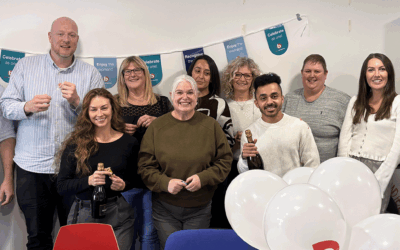By Sarah Rodricks on July 17, 2024
Our Pulmonary Rehabilitation programme is designed for people with chronic lung conditions who experience symptoms of breathlessness, helping them to self-manage in the long-term.
The aim is to improve the patient’s exercise tolerance, which in turn, can help them to feel less tired and increases their confidence and independence when exercising.
Paul’s story
At 68, Paul was struggling with severe emphysema. Simple tasks like getting dressed left him breathless, limiting his daily activities and diminishing his quality of life.
Referred by his GP, Paul joined our 8-week Pulmonary Rehabilitation program. Determined to make a change, he attended every session and actively engaged in educational talks. Within weeks, Paul noticed a difference. He could walk further, breathe easier, and was more confident leaving the house.
During the final week, while battling a chest infection, Paul used what he’d learnt to spot the infection early, and take the necessary steps to prevent it having a big impact on his health. Though the infection impacted his test performance, he felt more at ease, less anxious, and braver about venturing out.
Paul eagerly joined our 12-week maintenance program, continuing to exercise under a clinician’s supervision. With weekly check-ins, educational webinars, and personalised exercise plans, Paul kept pushing his limits.
The results
Everyone who comes to a Pulmonary Rehabilitation course has an initial assessment, and then we do the same ‘tests’ again so we can see the progress that has been made. These tests include an assessment of the time it takes to complete five stand-ups from an initial sitting position, a walking test, as well as a ‘shuttle’ test. All these tests are explained in full to anyone attending and the measurements are recorded.
After 20 weeks, Paul’s results from the exercise tests showed dramatic improvement. Paul’s oxygen dependence dropped, and he regained his independence. No longer reliant on others, he could get in and out of the car and handle daily tasks without being out of breath.
Paul’s journey through our Pulmonary Rehabilitation programs not only made an impact on his clinical outcomes, but helped reduce his anxiety and improved his quality of life.
“Before I came to this program, I really struggled with any form of physical activity. Everything was extremely difficult, and I couldn’t do much for myself. When I first started to come to the class, I had to get Molly to get my trolly and my oxygen out of the car for me because it was too heavy.
Now, after completing the 6-week program and the 12-week maintenance program, I no longer needs help with this and sometimes, I don’t even bring my trolly or use my oxygen if I am walking at a steady pace.
I don’t panic when I am out of breath now because I know how to get it back under control, so I am a lot more confident when going out. I am very grateful…because I feel like a new man.”
Paul
Here is a summary of Paul’s test results.
| Test | Week 1 | Week 8 (patient had chest infection) | Week 20 |
|---|---|---|---|
| Time to complete 5 Sit to Stands | 12 seconds | 14 seconds | 9 seconds |
| Number of repeitions of Sit to Stands in 1 minute | 9 reps | 12 reps | 18 reps |
| Incremental Shuttle Walk Test | 100m in Practice Walk, 140m in second walk. However, patient scored the exertion as 'Very Severe' on the breathlessness scale. | 140m | 180m |
| Before attending | After attending |
|---|---|
| - Oxygen use: 6L/min 24 hours a day - Needed assistance to get his oxygen trolley out of his car - Severe shortness of breath when climbing stairs - Short of breath when talking - Exercise was less than 50 minutes per week due to severe shortness of breath - No chest exacerbation management exercises – felt panicky and anxious when unwell. | - Oxygen use –to 2L/min 24 hours a day - No trolley needed – able to carry his oxygen cylinder in an oxygen backpack, allowing independence getting in and out of the car. - Slightly short of breath climbing stars - No shortness of breath talking - Exercise – more than140 minutes per week with moderate shortness of breath - Good chest exacerbation management exercises which helped him cope much better and reduced anxiety when he did have a chest infection |
Transforming health through education
We’re dedicated to empowering patients to manage their own health effectively.
We are proud to provide a range of education services to help people with long-term conditions, including pulmonary rehabilitation and our award-winning diabetes education programme.
We have a strong history of working within the NHS. Our services are well-attended with high conversion rates. If you’re interested in commissioning services for your area, get in touch.
Find out more about our people-provided healthcare education [Education Services – Spirit Health (spirit-health.com)]


